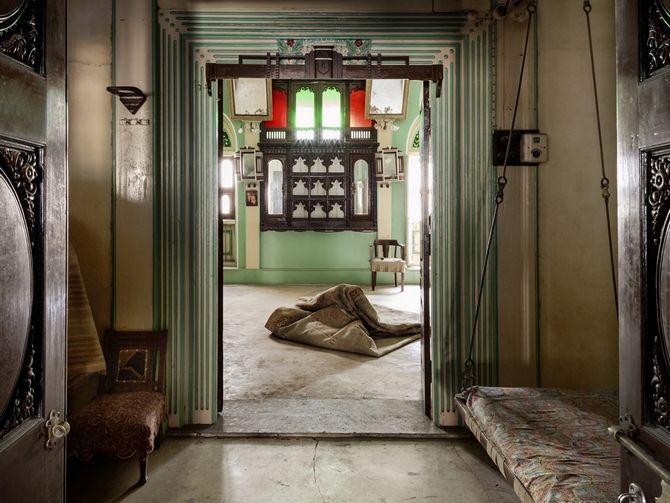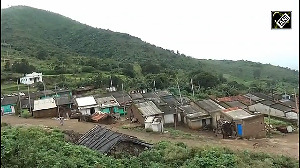A photo series by Sebastian Cortes explores the glorious past and rich legacy of the Bohra Muslims of Sidhpur

Look too closely at Sebastian Cortes' streetscapes depicting houses in turquoise, fuchsia pink and pistachio green and you begin to wonder if some unreported geological calamity resulted in the continent of Europe crashing into western India centuries ago.
How else do you explain the Venetian styled-palazzos depicted in the photos, which line not canals, but the streets of Sidhpur in Gujarat?

The colours are not the only anomaly -- the floral patterns on the exteriors seem a hybrid of Shekhawati and the baroque architecture of medieval Europe.
There are undoubtedly more prosaic reasons; the mercantile community of Bohra Muslims who built these handsome homes were influenced by Europe.

But this exhibition by Tasveer at the Dr Bhau Daji Lad museum in Mumbai is so sumptuous that everyday explanations pale when paired with the photographs.
There is one, for instance, that shows a boy leaning against a cart drawn by a camel set against what one guesses is the back porch of one of these mansions.
The boy is dwarfed by the camel.
The camel in turn is dwarfed by the buildings. Nothing appears to be done to scale.
Many of the photographs of the opulent interiors have no humans in sight.

This makes sense as it allows the eye to gaze on the ornate pillars and the spectacular tiles.
The mirrors in one living room face off against each other like aristocrats at a celebratory ball in Versailles.
The living room itself is grander than some durbar halls in Rajasthan.
In another photo, as viewers, we enter the room from a doorway.
The doors are embossed with what looks like an impossibly fecund palm tree.

A woman in blue sits with her back to us contemplating another woman in traditional Bohra dress in the next room.
For a moment, you think the mirrors are playing tricks on your sense of perception.
A few photos later, that is exactly what Cortes is doing; the back of a woman in the next room is visible through a mirror.
At least I think so; it looked also like one of Degas' Impressionist paintings of an Indian woman that might have been hanging on the wall.
Cortes does photograph some of the matriarchs of Sidhpur looking straight at the camera, but his strength is to capture women in Sidhpur seemingly unawares -- looking out the window in one frame, waiting at the door in another.

There are also striking photos of women performing mundane chores -- notably a woman cooking on the floor on a two-ringed gas stove right next to an exuberantly sculptured marble fireplace whose mantel is being used to place clay matkas for water.

One of the most unusual is of an angelic little boy reclining on a divan.
His expression is so befuddled, his dress so traditional and so pristine that after gawping at this photo for several minutes, you will conclude that a giant cuckoo clock has deposited the little boy on the sofa when the clock struck twelve.
In the introduction to the catalogue, Cortés expresses his own surprise that the inhabitants of Sidhpur themselves seemed rather matter-of-fact about their extraordinary surroundings.
"The inhabitants of most of the homes seem to have a rather distant relationship with the homes and the content," he says.
"Few could really give me any clear explanation or offer details about the architecture or detailing."
Cortes is an exceptional photographer blessed with painterly brushstrokes of rich detail, but he asks for too much.
If a time machine transported us to a setting this grand in a town that bears no resemblance to the present or the country it is situated in, the only truthful response would be incomprehension.

Tasveer and the Dr Bhau Daji Lad City Museum present Sebastian Cortes -- Sidhpur: Time Present Time Past in Mumbai, as part of the gallery's 9th season of exhibitions, in partnership with Vacheron Constantin.
It can be viewed at the Dr Bhau Daji Lad City Museum till April 30, 10 am to 6 pm.












 © 2025
© 2025